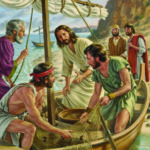The text for this lesson is Luke 4:16–30
Key Point
- Sin causes us to reject Jesus as the promised Savior. God’s Word shows that Jesus is God’s Son, and in faith, we believe.
- Law: Sin blinds me so I cannot see my Savior.
- Gospel: God works through His Word and Sacraments so I can see and believe in Jesus.
Discussion Points
- Describe the experience of spending time with people who remember what you were like when you were growing up. How does familiarity with a person’s background color your image of him or her? What would the people of Nazareth recall about Jesus’ childhood? How could this give insight into Jesus’ statement, “No prophet is acceptable in his hometown” (Luke 4:24)?
- What phrases in Luke 4:18–19 indicate that Jesus will be a teacher and work miracles? Read Luke 4:31–37. How does this account in Capernaum revisit the two primary themes from His previous sermon?
- In Luke 4:18, Jesus says that He will “set at liberty those who are oppressed.” As has been noted, the Greek word translated as “set at liberty” is often used to describe the forgiveness of sins, so this passage announces one of the major themes of Jesus’ preaching. Read Isaiah 53:6. In what way does sin still oppress us? In what sense are we liberated from the oppression of sin? See Luke 1:77 and 24:47.
- RJesus quotes the messianic prophecy of Isaiah 61 in Luke 4:18, “The Spirit of the Lord is upon Me, because He has anointed Me to proclaim good news to the poor.” Who else besides Jesus is mentioned in that verse? What event was a key revelation that Jesus is the promised Anointed One or Messiah? See Luke 3:21–22 and Acts 10:38.
- The language of Luke 4:18–19 indicates that God has come to restore the fallen creation, to release it from bondage to decay and death. Read Colossians 1:15–20. Whom does Paul describe as the Creator of all things? How does the Creator reconcile creation to Himself? How does Luke 4:18–19 support the theme of the restored creation?
- Luke 4:19 says that Jesus came to “proclaim the year of the Lord’s favor.” The background for this statement is found in Leviticus 25, in which the Year of Jubilee is prescribed to the Israelites. Read Leviticus 25:8–10. How often was the Year of Jubilee? What occurred during this year? What themes are found in both Leviticus 25:8–10 and Luke 4:18–19?
- What did Jesus mean in Luke 4:21 that “Today this Scripture has been fulfilled in your hearing”? To which passage does this refer? What does this say about the power of His preaching? What does preaching accomplish in the Church today? See 1 Corinthians 1:21–25.
6066T24spring3







